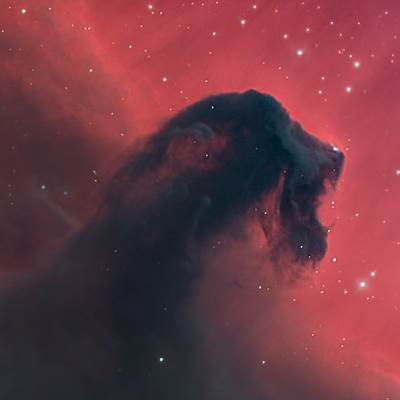Chess on Orion's Belt
We've seen the StarryKnight once before in Chess Nebula (January 2014; Europe-Echecs '55th Anniversary'). In that post I neglected to take the idea further, so let's rectify that. The chess connection has been observed frequently, as in Best of AOP: The Horsehead Nebula (caelumobservatory.com; Mt. Lemmon SkyCenter, University of Arizona; AOP: 'Advanced Observing Program', Kitt Peak):-
Chess, anyone? This is the most famous example of a dark nebula, that is, an opaque cloud of dust that obscures a bright nebula behind it. The Horsehead is about a lightyear across, and about 1200 lightyears away. It is backlit by IC 434, a red cloud of energized hydrogen which is illuminated by Alnitak (Zeta Orionis), one of the belt stars of Orion the Hunter.
When I was a child, Orion was my favorite constellation, because it was so easily recognizable by its belt. I imagine many people say the same.

Horsehead Nebula in Orion
© Flickr user StarryEarth under
Creative Commons.
The description said,
The Horsehead Nebula (Barnard 33, B33) is a cool, dark gas cloud located about 1500 light-years from Earth, south of the extreme left end of the belt of Orion constellation.
It is part of the Orion Molecular Cloud Complex and is approximately 3.5 light-years across. This dark nebula, characteristically shaped like the piece of a chess horse, is visible by contrast as it appears ahead of the reddish emission nebula IC 434.
The nebula was discovered photographically in the late 19th century by Williamina Fleming at the Harvard College Observatory, although it was not included in a catalog until 1919 by Edward Emerson Barnard.
Image obtained with the TTT1 telescope with L, Halfa, OIII and g filters.
The first sentence of that description leads to 122 Horsehead Nebula Stock Photos (dreamstime.com). For the second sentence, see Orion molecular cloud complex (wikipedia.org; 'The Orion complex is one of the most active regions of nearby stellar formation visible in the night sky, and is home to both protoplanetary discs and very young stars.'). For the third sentence, see Williamina Fleming (wikipedia.org). The page starts,
Williamina Paton Stevens Fleming (1857–1911) was a Scottish-American astronomer. She was a single mother, hired by the director of the Harvard College Observatory to help in the photographic classification of stellar spectra.
The fourth sentence does not compute. If, like me, astronomy leaves your head spinning, see 'It looks like the chess Knight!' (November 2008). The original Flickr page is still there after all these years.




No comments:
Post a Comment